For the last couple of years the press headquar- ters at the Toronto Film Festival have been on Cumberland between Bay and Yonge. Toronto Star critic Peter Howell informs that the press digs for this year’s TIFF are being moved to the Sutton Place Hotel — an “improvement,” Howell says. Maybe, but the Sutton is about six blocks south of the Varsity, and then another six blocks to get back.
Day: August 12, 2007
Lim on “The Invasion”
An obvious irony is ignored by Dennis Lim in his 8.12 N.Y. Times essay about the persistence of the body-snatcher metaphor in American cinema, with four films based on or inspired by Jack Finney‘s original 1955 novel having been made over five decades — Don Siegel‘s Invasion of the Body Snatchers (’56), Phil Kaufman‘s same-titled version (’78), Abel Ferrara‘s Body Snatchers (’93 and now Oliver Hirschbiegel‘s The Invasion, which comes out Friday.
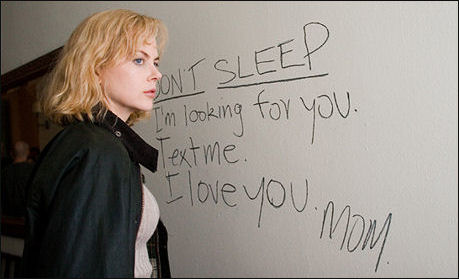
Nicole Kidman in The Invasion
All of these works have been, as Lim puts it, “unmistakable portrait[s] of individualism under siege” — about hordes of fair-minded mainstream pod guys doing whatever they can to persuade the last rebel holdouts to go to sleep and become conformist pods themselves.
And yet Lim doesn’t mention that late in The Invasion‘s principal photography phase (or in the early post-production phase) HIrschbiegel was himself surrounded and overwhelmed by Warner Bros. pod producers who wanted him to make a more conventionally satisfying horror film — i.e., one that presumably delivered the usual shocks and whammies. Hirschbiegel was replaced — i.e., forcibly “put to sleep” — and his original cut was largely rewritten and re-shot by the Wachowski Bros.
Maybe Hirschbiegel’s original cut was awful, and maybe the “suit” version is a good ride. But how could anyone write about The Invasion and not at least allude to this?
God’s Lonely Man
“It must also be said that many of those who now call themselves Christians are rich and pious themselves, and are no better, I fear, that the Pharisees. Indeed, they are often greater in their hypocrisy than those who condemned me.
“Now, in these days, many Christians believe that all has been won for them. They believe it was already won before they were born. They believe that this victory belongs to them because of my suffering on the cross. Thereby does my Father still find much purpose for me. It is even by way of my blessing that the Lord sends what love He can muster down to that creature who is man and that other creature who is woman, and I try to remain the source of love that is tender.
“For love is not the sure path that will take us to our good end, but is instead the reward we receive at the end of the hard road that is our life and the days of our life. So I think often of the hope that is hidden in the faces of the poor. Then from the depth of my sorrow wells up an immutable compassion, and I find the will again to live and rejoice.” — excerpted from pages 239, 241 and 242 of Norman Mailer‘s The Gospel According to the Son, which was published eight years ago.
“Taxi Driver” sepia gripe
This is a fairly old gripe, but with the release of the new Taxi Driver special edition double-disc DVD on 8.14 it seems allowable to dredge it up again. It’s addresses the core definition of the term” original vision” so it’s a fairly major issue.
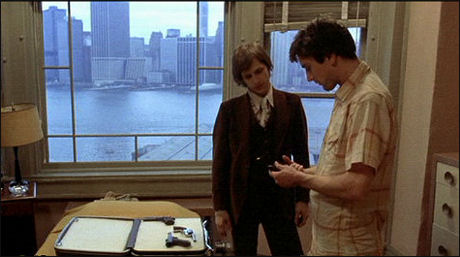
When this 1976 film was restored sometime around ’96 or ’97, director Martin Scorsese made the decision to leave the brownish sepia tint over the final shoot- out scene in that lower East Side tenement building, even though it wasn’t part of his original vision to have it look this way. Scorsese was forced into the brown-tint alternative (i.e., which toned down the red-blood shots) by the ratings board, and his explanation for keeping this muted color scheme is that “this is how the film looked when it came out…this is what it was, a product of the time we were living in, the forces we were dealing with.”
The brownish tint obviously had nothing to do visually, thematically or conceptually with the rest of the film — it was a political solution enforced by persons who had nothing to do with Taxi Driver until it was in post — and it obviously separates this sequence from the rest of the film. (It looks just as jarring and strange today as it did 31 years ago.) In this sense Taxi Driver is very much a co-directed film, and obviously not to anyone’s credit. .
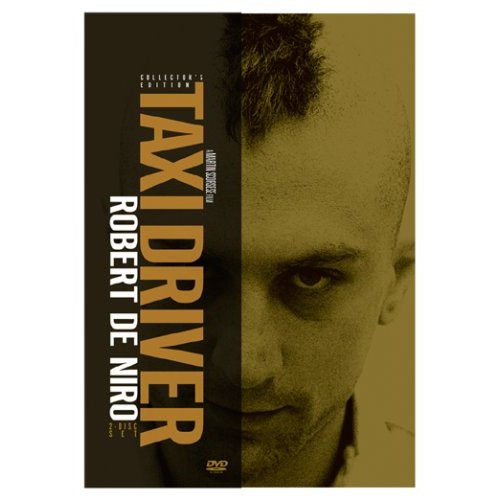
And yet Scorsese, a cineaste extraordinaire who’s fought for the restoration of classic films all his life, wants it to stay brownish for a reason that no other artist in any medium has ever used. He’s the only movie director in world history to not only accept but defend the vandalizing of one of his own works….amazing
Imagine Leonardo Da Vinci‘s “Mona Lisa” hanging today in the Louvre with a big grayish smear across the lower right side of the painting because one of Da Vinci’s assistants happened to spill a jar of paste as he was framing it way back when. And Louvre restorationists haven’t cleaned it off because Da Vinci, wanting to respect the conditions under which he created this legendary work, made it clear to his contemporaries that he wanted it left alone. How would this differ from what Scorsese is saying? God’s lonely man indeed.
Jonah Hill’s EW attitude
This photo of a photo doesn’t really capture how bizarrely airbrushed and pancaked Jonah Hill‘s face is on the cover of the current EW (#948, 8.17), and how his expression is mainly distinguished by how completely divorced it is any of the emotions or attitudes he projects in the film…weird.

“Superbad” round-table
An Entertainment Weekly round-table discussion of Superbad (Sony, 8.17) went up Friday, moderated by Josh Rottenberg and featuring Seth Rogen, Judd Apatow, Jonah Hill and Michael Cera. My favorite portion is as follows:
Seth Rogen: I’m noticing when you do a lot of interviews, often the reporters go in with something they want you to say and they’ll keep asking questions until you say it. And the two things that people seem to want us to say more than anything is that audience’s tastes have changed and that we are all unconventional guys to be in comedies — both of which I very strongly disagree with.
Judd Apatow: Don’t they remember Jack Klugman?
Rogen: Exactly!
Apatow: I always talk about Jack Klugman. In fact, when I was trying to get ”unconventional” kids on Freaks and Geeks…that’s a code word I use….
Rogen: …for Jewish. [Laughs] ”There are too many goddamn unconventionals at this country club!”
Apatow: ”I’ve got to go to temple with my unconventional friends.” But I always talked about Jack Klugman. Like, if you looked at all the great old television comedy, it was always Jack Klugman and Tony Randall and Phil Silvers.
Rogen: We’re the new Phil Silvers, Jack Klugman, and Tony Randall!
Apatow: I don’t know when it became that people thought funny people were all so handsome. That’s just an idea that I’ve always rejected. But what happens is that when people become popular, then people think they’re sexy also for some reason.
Jonah Hill: Thank God. Well, I think it’s funny because every interview they say, ”You guys are leading men now and you’re so unconventional,” or whatever the hell the word is…
Michael Cera: Untraditional.
Hill: And I go, like, ”Do you guys think Will Ferrell and Jack Black look different from us? Those guys are big movie stars!”
Rogen: If every comedy star is unconventional, doesn’t that then become conventional?
Apatow: Do you guys get insulted by that?
Rogen: No, I honestly just think they’re crazy. It makes me feel like they’ve never heard of Albert Brooks or Woody Allen or W.C. Fields or the Marx Brothers or any other comedian.
Hill: They’re acting like we’re making movies like Bourne Ultimatum. It’s not like we’re in like f—ing Ocean’s 11 or something like that. We’re making comedies!
Rogen: It’s a weird stance to take.
Hill: And it’s everybody’s stance.
Love Blows
The initial assumption was that the Farrelly Brothers‘ version of The Heartbreak Kid (Dreamamount, 10.5), which costars Ben Stiller and Michelle Monaghan, is a remake of Elaine May‘s The Heartbreak Kid, which came out 35 years ago with Charles Grodin and Cybil Shepard in the leads. It is that, of course, but there are indications that it may be a much coarser and more slapsticky thing than May’s film, and with fewer mixed-bag subtleties in terms of the characters.
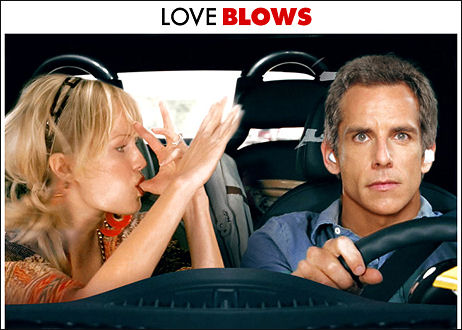
The self-absorption in Grodin’s character was fairly deranged (he sees women primarily as challenges, and begins to disengage once he’s won them over and/or possessed them), and the New York-area Jewish girl he marries at the beginning (Jeannie Berlin) is grating and inelegant but at least half sympathetic — the scene in which Grodin drops her in a Miami Beach restaurant is somewhere between sad and grotesque. Stiller’s guy, on the other hand, is said to be more likable and less looney tunes, and the woman he marries early on (Malin Aker- man) is portrayed as a batshit caricature of someone you’d definitely want to un-marry as soon as possible.
In this sense the new Kid seems to bear a slight resemblance to Jeff Franklin‘s Love Stinks, a 1999 comedy about a guy who gets caught up with a gold digger from hell. The connection is obviously being telegraphed by the Heartbreak Kid marketing guys with their slogan — “Love Blows.”
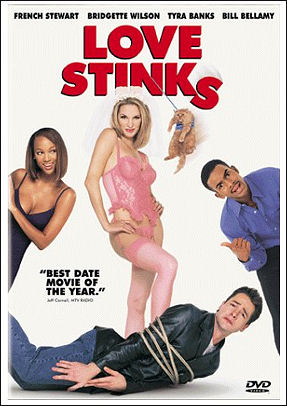
I haven’t seen the film and it may be fine on its own terms, but if the what I’m hearing and reading turns out to be true then c’est la guerre — that’s how things are. The ’70s were the ’70s and now is right now. Just because a character comedy directed by one of the smartest and most sophisticated female comedy auteurs (working from a script by Neil Simon) of all time worked on its own terms back then doesn’t mean it’ll work by today’s standards. You have to gorilla things down today…make something that the Seth Rogen crowd will laugh at. The Elaine May-Charles Grodin comic aesthetic is way too fussy and neurotic and smarty-pants. Let it go, move on.
Ari-Lloyd forever
I’m an Ari-Lloyd latecomer, and ashamed to admit this. I didn’t, couldn’t and wouldn’t understand until recently that their relationship is easily the best thing on Entourage, and that without it there’d be next to nothing. The genie is out of the bottle and you can’t reconfigure, but if things had worked out differently a stand-alone Ari-Lloyd movie — the agency, Ari’s marriage and Lloyd’s outside-the-agency life being the core with the four homies strictly backup — could have been something else.
